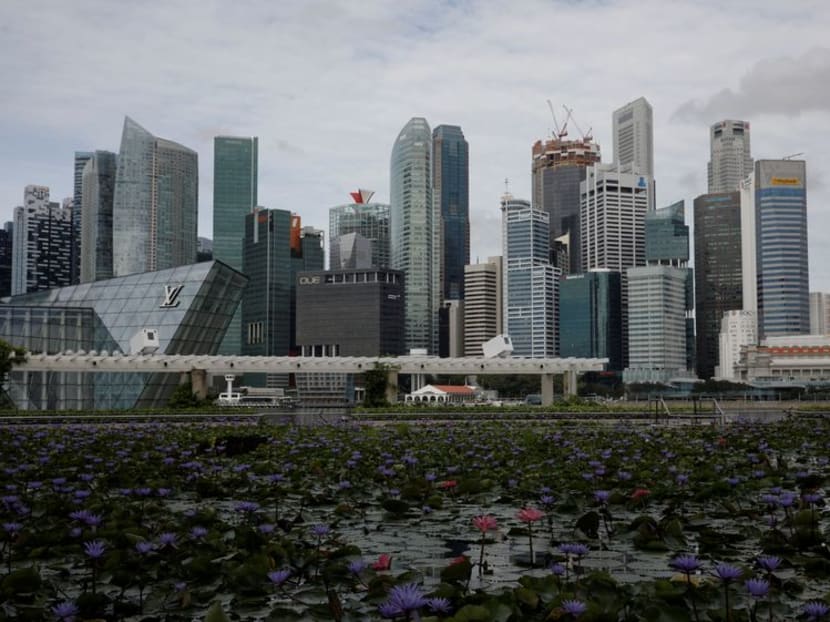Government will act if cost pressure worsens, says Finance Minister Lawrence Wong
The Government is closely monitoring economic and inflation risks after tensions in Eastern Europe escalated sharply with Russia’s invasion of Ukraine.

FILE PHOTO: View of the central business district skyline in Singapore Mar 26, 2021. (Photo: Reuters/Edgar Su)
SINGAPORE: The Government will take further action to protect jobs and help Singaporeans deal with increased costs, if the external situation worsens, said Finance Minister Lawrence Wong on Wednesday (Mar 2) in the Budget 2022 round-up speech.
Mr Wong said that since he delivered the Budget statement on Feb 18, the tensions in Eastern Europe have escalated sharply with Russia’s invasion of Ukraine.
While Singapore’s direct trade links with Russia and Ukraine are relatively small, the conflict will affect the global economy and energy market, he said.
Singapore is thus enhancing the resilience of its energy supplies, taking steps to moderate the effect of higher inflation and has introduced measures in the Budget to help households and businesses.
“We are monitoring the external situation and the risk for our economy closely - risk in terms of both growth and inflation. When the situation worsens, we will not hesitate to take further actions … to protect jobs and to help households and businesses deal with increased cost,” Mr Wong said.
Responding later to clarifications from Leader of the Opposition Pritam Singh, Mr Wong added that if inflation turns out to be more persistent and higher than expected, the Government will “deal with that decisively and separately”.
“We have monetary policy to deal with inflation, we are able to do take a series of actions to better secure our energy supplies. And thirdly, we can help households and businesses directly - we have the resources to do so,” said Mr Wong.
“And if the need arises, we will not hesitate to take all of these actions.”
COST PRESSURES FOR BUSINESSES
On Wednesday, several Members of Parliament raised concerns about the large number of policy and tax changes in the Budget, which could add to cost pressures for businesses. In response, Mr Wong said that the Government is continuing to provide “significant support” to sectors still facing difficulties from the pandemic.
This year’s Budget includes a GST hike of 2 per cent that will be phased in over two years from the start of 2023, a further tightening of foreign worker policies and a large future increase in carbon tax.
The concerns of local businesses are why these changes have been announced ahead of time, but will happen stepwise over the next few years, said Mr Wong.
“What we are doing is to be upfront, clear and transparent to businesses. We are announcing these moves well ahead of time so that businesses can plan ahead,” he said, emphasising that there are many government grants and schemes to help small- and medium-sized enterprises (SMEs).
Another key concern shared by MPs in the Budget debate was the crunch in manpower.
Mr Wong said that a current shortage of work permit holders will ease in the next few months as Singapore progressively opens its borders, and sectors that urgently need workers, such as construction, marine and process industries will be given priority.
“At the same time, firms should continue to take full advantage of the various schemes and support job redesign and improve productivity to become more manpower efficient,” he said.
Keeping the cost of employing foreigners low will mean depressing the wages of local workers over time, he pointed out.
“Our focus, therefore, is not to hold down labour cost indefinitely, but to support efforts by our firms to be more productive and innovative, so that they can be competitive and successful given as labour costs gradually increase.”
Emphasising again that changes to Singapore’s foreign worker policy are “careful, calibrated adjustments”, Mr Wong said the latest moves in Budget 2022 would help to ensure that the workers coming to Singapore are of the right calibre and are deployed in areas where they can complement the local workforce.
But he also made clear that Singapore is not closing itself to the inflow of foreign workers and professionals.
IS BUDGET 2022 FAIR TO ALL SINGAPOREANS?
Mr Wong said that the emphasis in the Budget “has something for everyone”, and is designed to provide opportunities for all to succeed.
“In fact, a significant part of our social spending goes towards ensuring broad access to affordable and quality housing, health care, education, and lifelong learning,” he said.
“These are important social provisions and they support the aspirations of all Singaporeans.”
But while it provides for all, it is designed to “tilt the support” to those who need it more.
Significant resources have been set aside in this Budget for progressive wages and the Workfare Income Supplement scheme, he said.
A Progressive Wage Credit was announced during the Budget to help offset mandatory wage increases for lower-wage workers; and wage subsidies under the Workfare Income Supplement scheme are to be raised, and be given to more low-income workers.
And as incomes rise, the net benefits are reduced, but these Singaporeans benefit from “the political stability, the social cohesion, and the overall environment that we provide in Singapore”, said Mr Wong.
In addition, the tax burden for middle-class Singaporeans is low compared to other cities.
“For the relatively low amount of taxes they pay, they enjoy many benefits in Singapore - affordable public housing and healthcare, beautiful parks, excellent infrastructure, quality pre-schools, schools and tertiary institutions with highly subsidised fees.”
When seen together, Singapore’s system of taxes and transfers is “highly progressive” and reflected in its benefits-to-tax ratio.
On average, the Singapore households with incomes in the bottom 20 per cent get S$4 in benefits for every dollar of tax paid, the middle 20 per cent get about S$2 for every dollar, while the top 20 per cent are “net contributors”, getting about 30 cents for every tax dollar, said the minister.
While the system is not perfect and is continually being reviewed, it is “fair, progressive and effective”.
Said Mr Wong: “It reflects our values, what we stand for and who we are as a people, and it provides a strong foundation for us to build our economy and our society.”
ETHOS AND VALUES
Mr Wong also said that the Budget should be seen in more than “monetary terms” as it reflects Singapore's “ethos and our values”.
“It's an expression of our shared compact, to tackle our challenges to tap together, to never stop thinking of tomorrow and to never cease building a better Singapore,” he said.
“All this boils down to trust … trust between the Government and the people, the trust we have in one another, and trust across the generations.”
While not “politically expedient”, the Budget will help to put Singapore in a stronger position to deal with problems of the future, said Mr Wong.
“In this Budget, I've set out plainly the challenges and also the opportunities ahead of us and explained why we need to move on difficult measures, like the GST increase. It is not the popular thing for me to do, certainly not for my first Budget as Finance Minister. But I have a responsibility to do what's right,” he said.
The Budget was passed on Wednesday afternoon with dissent from the opposition MPs from the Workers’ Party and the Progress Singapore Party, who had opposed the GST increase.









